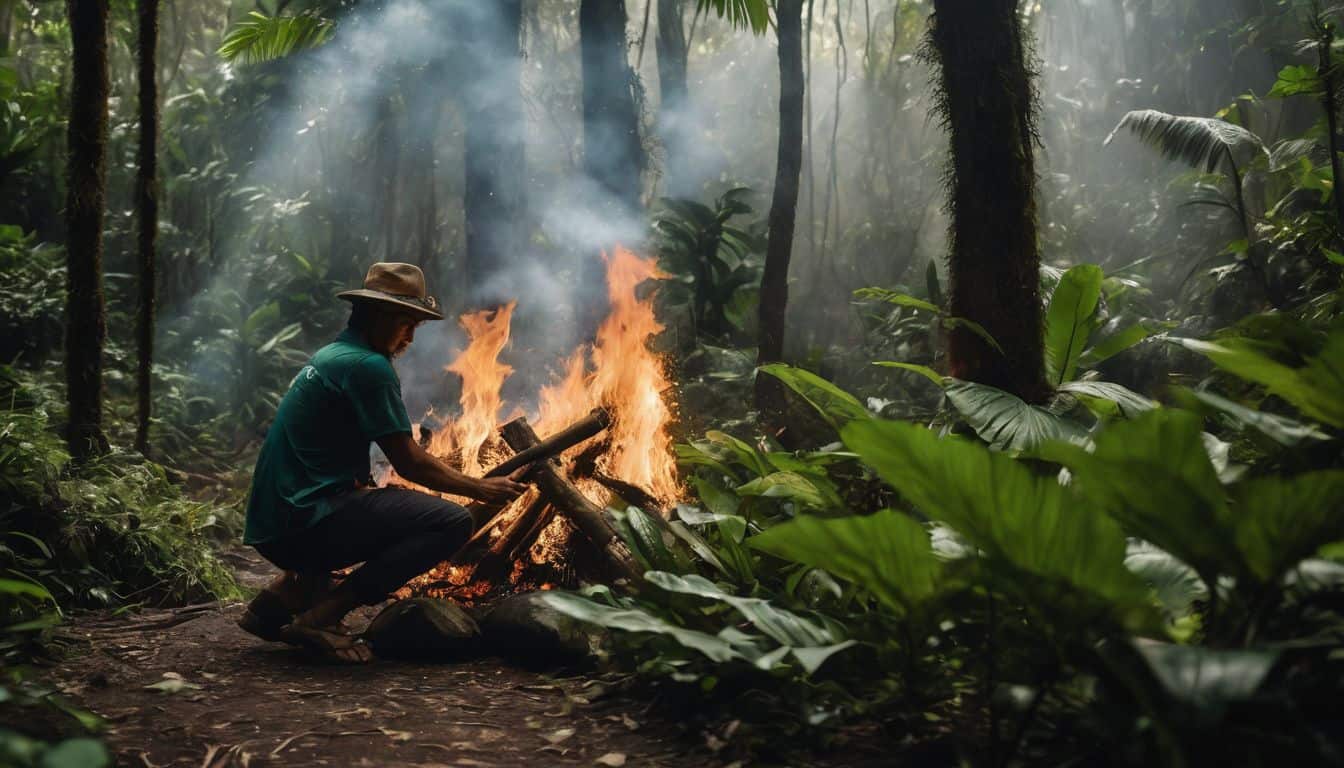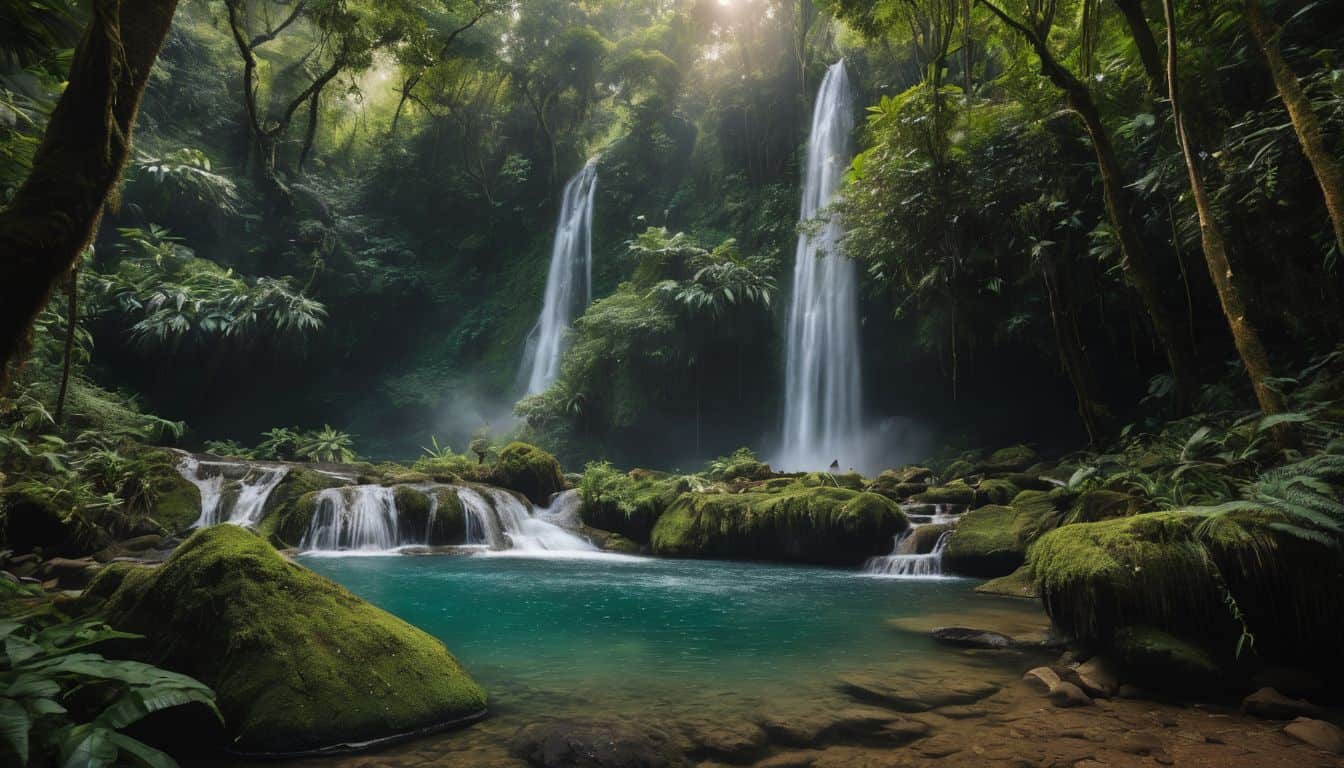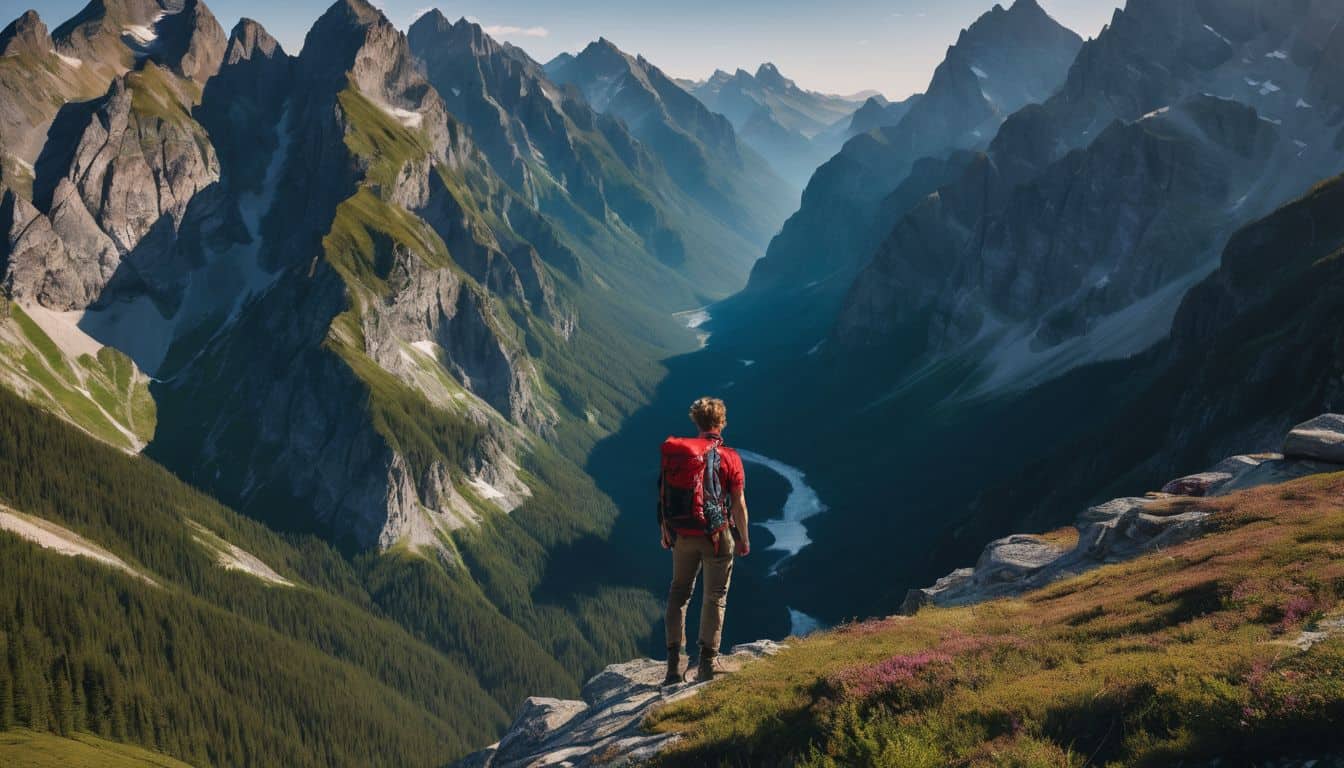Finding yourself smack dab in the middle of a vibrant jungle might seem like a grand adventure for some. Heck, it could be straight out of an Indiana Jones flick! However, without a handful of essential survival skills tucked under your belt, this thrilling escapade can venture into daunting territory quite rapidly.
As someone who has stared such experiences right in the eyeballs, there’s nothing I cherish more than sharing these vital tidbits with those hungry for knowledge – did you know that finding a squeaky clean water source is high up on that list? It’s absolutely non-negotiable for survival, my intrepid friend.
In this blog post, we’re going to roll up our sleeves and dig into seven effective ways to keep your cool (and stay alive!) when faced with Mama Nature’s wild side. This includes crafting a snug shelter from scratch, getting crafty while nibbling on nature’s pantry and executing basic first aid techniques without batting an eyelid.
So strap on your adventure boots – let’s dive headfirst into exploring these life-saving hacks together!
Key Takeaways
- Finding water is crucial for survival in the jungle. Look for streams, lakes, and signs of condensation on plants. Boiling water is the safest way to ensure it’s drinkable.
- Getting food involves finding fruit trees, learning how to hunt and fish, catching bugs, and foraging edible plants.
- Building a shelter requires choosing a high and dry spot, using strong sticks or tree trunks for the frame, covering it with leaves or grass, piling more branches on top, and tying everything together.
- Avoiding dangers includes watching out for predators like snakes and big cats, avoiding fallen trees and slippery rocks, protecting yourself from the sun, and preventing cuts from becoming infected.
Essential Jungle Survival Skills
Finding water, getting food, building shelter, avoiding dangers, getting out of the jungle, building a fire, and creating potable water are crucial skills for surviving in the jungle.
Finding Water
I am excited to share some tips about finding water in the jungle. This is a core part of survival skills.
- Look for streams or lakes. These are common sources of water in the jungle.
- Watch for condensation on plants. This can be a sign of nearby water.
- Use your senses. Sometimes you can smell or hear water before you see it.
- Dig deep if need be. There may be fresh water underground.
- Boiling is best once you find it! It’s a top way to make sure the water is safe to drink.
Getting Food
I learned a lot of things from Thai and U.S. soldiers about jungle survival skills. One key skill is finding food in the wilderness. Here’s how you do it:
- Look for fruit trees: Jungle is full of them. But stay away from the ones you don’t know.
- Hunt animals: This should be your last choice. You have to know how to clean and cook the meat.
- Learn to fish: If there’s water, there’s fish!
- Catch bugs: It might sound yuck, but bugs are easy to find and high in protein.
- Forage plants: Many plants in the jungle are safe to eat.
Building Shelter
Building a shelter in the jungle is vital. Here are some steps to follow:
- Choose a spot that is high and dry. Stay away from river banks or low places where water could collect.
- Use strong sticks or tree trunks for your frame. Lean them up against a tree to create a triangle shape.
- Cover the frame with wide leaves or grass to keep out the rain and wind.
- Pile more branches on top for added cover.
- Use vines or other natural materials to tie everything together.
- Take time to make your shelter sturdy and safe.
Avoiding Dangers
Avoiding dangers is crucial when it comes to surviving in the jungle. Here are some important tips:
- Watch out for predators like snakes and big cats.
- Be cautious of fallen trees that can block your path or cause injury.
- Avoid slippery rocks that can lead to falls and injuries.
- Protect yourself from the sun to prevent sunstroke.
- Be careful not to get cuts and scratches, as they can easily become infected in the jungle.

Getting out of the Jungle
When you find yourself in the jungle, it’s crucial to know how to navigate your way out safely. Here are some essential jungle survival skills to help you get out of the jungle:
- Stay calm and assess your situation.
- Use landmarks, such as rivers or mountain ranges, to orient yourself.
- Create a makeshift compass using a needle or a small piece of metal and a leaf.
- Find high ground or climb a tree to get a better view of your surroundings.
- Look for signs of civilization, such as paths or cleared areas.
- Follow bodies of water downstream, as they often lead to civilization.
- Leave markers along your path, like broken branches or piles of rocks, so you don’t backtrack.
Building a Fire
Building a fire is essential for survival in the jungle. Here are some important facts about building a fire:
- Fire building techniques are crucial for surviving in cold weather.
- Knowing how to start and maintain a fire is important in a wilderness survival situation.
- To start a fire in the wilderness, you can use easily ignitable materials like paper or dead grass.
- Teaching kids how to build a fire can boost their confidence, enhance self – esteem, and create a bond with nature.
Creating Potable Water
Obtaining clean drinking water is crucial for surviving in the jungle. Here are some essential ways to create potable water:
- Rainwater collection: Take advantage of the abundant rainfall in the jungle by collecting rainwater in containers or using large leaves.
- Water filtration: Use a DIY filter made from layers of sand, gravel, and charcoal to remove impurities from murky water sources.
- Solar stills: Construct a solar still by digging a hole and covering it with plastic or a tarp. As the sun heats up the hole, condensation will form, providing you with drinkable water.
- Boiling: Boil water over a fire to kill harmful bacteria and parasites, making it safe to consume.
- Natural sources: Look for natural springs or flowing streams, as they often provide clean and safe drinking water.
- Plants for hydration: Learn about local plants that can provide hydration in emergencies, such as bamboo or certain cacti.
Foraging for Food
Foraging for food is a crucial skill to survive in the jungle. Here are some essential tips:
- Find edible plants like cattails, acorns, stinging nettles, tubers, rosehips, weeds, yarrow, and plantains.
- Learn to identify these plants through books or training.
- Practice sustainable foraging by not taking too much from one area.
- Be cautious of poisonous plants and avoid them at all costs.
- Consider learning about subsistence hunting if you’re comfortable with it.
- Always prioritize safety and be aware of your surroundings while foraging.
Tying Knots
Tying knots is an important skill for surviving in the jungle. Here are six basic knots that can be extremely helpful in wilderness situations:
- The square knot: This knot is used to join two ropes of equal size together securely.
- The bowline knot: This knot creates a loop that won’t slip or come undone, making it great for creating makeshift harnesses or hoisting gear.
- The taut-line hitch: This knot is adjustable and useful for securing tents or tarps to trees or poles.
- The clove hitch: This knot is quick and easy to tie and is ideal for attaching ropes to posts, trees, or other objects.
- The sheet bend: This knot is used to join two ropes of different sizes together, making it handy for many different applications.
- The figure-eight knot: This knot creates a stopper at the end of a rope, preventing it from slipping through loops or equipment.
Basic First Aid
Basic first aid is an essential skill for surviving in the jungle. Here are some important first aid techniques to remember:
- Treating Cuts and Scrapes: Clean the wound with clean water or antiseptic solution. Apply an antibiotic ointment and cover it with a sterile bandage.
- Addressing Dislocations and Fractures: Immobilize the injured area using splints or improvised materials. Seek medical help as soon as possible.
- Dealing with Burns: Cool the burn under running water for at least 10 minutes. Cover it with a clean cloth or non-stick dressing.
- Managing Heat Exhaustion: Move the person to a cooler place and have them rest. Offer plenty of fluids and apply cool, wet towels to their body.
- Handling Snake Bites: Keep calm and still to slow down the venom’s spread. Immobilize the affected limb and seek immediate medical assistance.
- Recognizing Allergic Reactions: If someone experiences severe itching, swelling, or difficulty breathing after an insect bite or sting, call for emergency help right away.
- Preventing Hypothermia: Warm up the person by placing them in warm clothing or blankets. Provide warm beverages if available.
Basics of Jungle Survival Skills

In the jungle, it’s important to know some basic survival skills. One skill you need is finding water. You can collect rainwater from leaves and bamboo stalks. Another skill is building a fire to stay warm and cook food.
Tying knots is also important for making shelter and securing items. Basic first aid knowledge can help you treat injuries in an emergency situation. And don’t forget about fishing techniques in the jungle.
These are just a few of the basics of jungle survival skills that can help you stay safe and survive in the wild.
Building a fire, tying knots, collecting water, these are all essential skills for surviving in the jungle.
Steps to Surviving in the Jungle
Surviving in the jungle requires certain steps and skills. Here are the important things to remember:
- Find water sources: Water is crucial for survival. Look for rivers, streams, or collect rainwater. Stay hydrated to avoid dehydration.
- Obtain food: Forage for edible plants, fruits, and nuts. Learn about safe options in your surroundings. Hunt small animals if necessary.
- Build shelter: Create a sturdy shelter using branches, leaves, and natural materials. It will protect you from weather conditions and dangerous wildlife.
- Avoid jungle dangers: Be cautious of venomous snakes, spiders, and insects. Stay away from unfamiliar plants that could be harmful.
- Navigate and find a way out: Use landmarks or a compass to stay on course and find your way back to civilization.
- Stay hydrated: Remember to drink enough water throughout the day to prevent heat exhaustion or dehydration.
- Teamwork is key: If you’re in a group, work together and support each other’s needs for better chances of survival.
Expert Q&A
In the expert Q&A session, I had the opportunity to ask our survival expert some important questions about jungle survival skills. The expert provided valuable advice and tips for individuals facing jungle survival situations.
We discussed topics like finding food and water sources, building shelters, navigating through the jungle, and staying safe from dangerous wildlife.
According to the expert, it’s crucial to have knowledge of edible plants in the jungle and how to locate them. They also emphasized the importance of finding a clean source of water or knowing how to make it safe for drinking by using purification techniques.
When it comes to building shelter, our expert suggested using materials readily available in nature such as branches and leaves.
When asked about navigating through dense jungles, they recommended using natural landmarks and learning basic orienteering skills. Wildlife safety was another key point discussed during the Q&A session.
It is essential to understand animal behavior and take necessary precautions to avoid encounters with dangerous creatures.
Overall, the Q&A session offered practical tips that can help both novice and experienced adventurers survive in challenging jungle environments by equipping them with essential skills and knowledge.
Video Resources
Video resources are a great way to learn jungle survival skills. These videos offer tips and techniques on important things like hunting, fishing, building shelters, and finding water sources in the jungle.
One popular actor who used these survival tips is Daniel Radcliffe in his film role. The Smart Soldier series also provides helpful tricks for surviving in the jungle. You can find videos that teach essential wilderness survival skills such as how to build a fire, create a temporary shelter, and establish priorities in a survival situation.
So if you’re looking for visual guidance on jungle survival, these video resources are definitely worth checking out!
Importance of Jungle Survival Skills
Survival skills in the jungle are incredibly important because they can save your life. These skills enable you to navigate through difficult situations, find food and water, build shelter, and protect yourself from dangers.
The ability to survive in the wild connects us with nature and teaches us self-reliance. It also allows us to appreciate the beauty of the natural world and understand how we fit into it.
Teaching these skills to children not only builds their confidence and self-esteem but also instills a love for outdoor exploration. By learning jungle survival techniques, we become more adaptable individuals who can handle unforeseen challenges with a calm and positive mindset.
So remember, having basic jungle survival skills is essential for anyone who wants to explore the untamed wilderness and truly connect with nature.
Tips for Teaching Kids Jungle Survival Skills
Teaching kids jungle survival skills is a great way to bond with them and help them develop important life skills. Here are some tips to get started:
- Start with basic skills: Teach kids how to find water nearby, build a campfire, construct a fort for shelter, and learn basic first aid.
- Make it fun: Turn survival skills training into a game or adventure. Kids will be more engaged and excited to learn.
- Practice in the backyard: Begin teaching survival skills in a safe environment like your backyard. This allows kids to gain confidence before exploring the wilderness.
- Use age-appropriate language: Explain concepts using simple words that kids can understand. Break down complex tasks into smaller steps.
- Provide hands-on experiences: Let kids practice survival skills themselves under supervision. This helps them develop practical knowledge and builds confidence.
- Equip them with essential tools: Give children a whistle, survival blanket, and kit they can use if they get lost or need help in the wilderness.
- Encourage curiosity and observation: Teach kids to be observant of their surroundings, identify edible plants, tracks of animals, and other signs of nature.
- Teach Leave No Trace principles: Instill respect for nature by teaching kids how to minimize their impact on the environment while exploring the wilderness.
Recommended Gear for Jungle Survival
When venturing into the jungle, it’s important to be prepared with the right gear. Here are some recommended items:
- Plant identification guide: A handy resource for identifying edible plants and avoiding poisonous ones.
- Tactical gear and wearables: These sturdy items are designed for the rugged jungle environment.
- Survival kit essentials: Include first aid items, a water purification system, fire starting equipment, signaling items, and tools for procuring food.
- Field knife: A versatile tool for cutting branches, preparing food, and self-defense if necessary.
- Paracord: Useful for building shelters, creating traps, and securing equipment.
- Water filter or purifier tablets: Ensure you have access to clean drinking water in the jungle.
- Fire starter: An essential tool for cooking food and staying warm in the wilderness.
- Insect repellent: Protect yourself from pesky mosquitoes and other bugs that can carry diseases.
- Navigation tools: Carry a compass or GPS device to help you find your way out of the jungle.
Common Mistakes to Avoid in Jungle Survival
Survival in the jungle can be tough, but avoiding these common mistakes can increase your chances of success:
- Neglecting key principles: It’s important to have a plan and stick to it. Don’t let panic or fear cloud your judgment.
- Getting wet: Always stay dry when possible. Wet clothes can lead to hypothermia and make survival even more challenging.
- Drinking unpurified water: Drinking dirty water can make you sick. Always purify water by boiling it or using purification tablets.
- Lack of fire-building skills: Fire provides warmth, light, and the ability to cook food. Learn how to build a fire properly before heading into the jungle.
- Not prioritizing: In a survival situation, it’s crucial to prioritize finding food, water, and shelter over anything else.
- Ignoring signs of predators: Be aware of your surroundings and watch for signs of dangerous animals like snakes or big cats.
- Not conserving energy: Save your energy by avoiding unnecessary physical exertion and focusing on essential tasks only.
- Not knowing basic first aid: Knowing how to treat injuries in the wilderness could save your life or the life of someone else.
- Overpacking unnecessary items: Only bring what is necessary for survival, as excessive weight can slow you down and drain your energy faster.
- Lacking knowledge and preparation: Before venturing into the jungle, educate yourself about its environment, wildlife, and survival techniques specific to that region.
Conclusion on Jungle Survival Skills
Mastering jungle survival skills is crucial for anyone venturing into the wilderness. By learning essential skills like finding water, building shelter, and foraging for food, individuals can navigate and survive in the challenging jungle environment.
Basic first aid knowledge and the ability to tie knots are also important. Remember, preparation is key – take inventory of available resources before heading out. With these seven ways to success in your toolkit, you’ll be well-equipped to handle any situation that comes your way in the jungle.
FAQs on Jungle Survival Skills
1. What are some important jungle survival skills?
Important jungle survival skills include finding clean water sources, building a shelter, starting a fire, identifying edible plants and insects, and navigating without a compass.
2. How do I find clean water in the jungle?
To find clean water in the jungle, look for streams or rivers where the water is flowing and clear. It’s important to purify the water by boiling it or using purification tablets before drinking.
3. Can I eat any plants or insects in the jungle?
While there are some edible plants and insects in the jungle, it is crucial to have proper knowledge of which ones are safe to consume. Avoid eating anything unless you are confident about its safety.
4. How do I build a shelter in the jungle?
To build a shelter in the jungle, look for sturdy branches or trees that can serve as support beams. Use leaves, vines, or other natural materials to create walls and roof for protection against rain and wildlife.
5. What should I do if I get lost in the jungle?
If you get lost in the jungle, try to stay calm and avoid panicking. Look for landmarks or follow a stream downhill to increase your chances of finding civilization. If all else fails, signal for help using bright clothing or by creating smoke with fire.





Leave a Reply